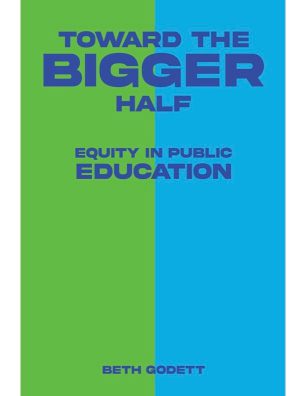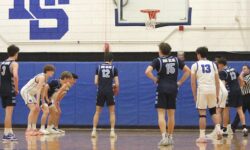By Julia Beauregard
Hometown Weekly Editor
Local author and educator, Dr. Beth Godett, recently published her new book, “Toward the Bigger Half: Equity in Public Education,” which offers an exploration regarding equity and schooling uncomfortable, yet necessary, companions. Hometown Weekly Editor, Julia Beauregard, had the pleasure of interviewing Dr. Godett ahead of her local author talk that will be held at the Medfield Public Library this Sunday afternoon.
What inspired you to write this book?
Throughout my career I have been involved in efforts to improve public education to better serve children of all ages. During COVID-19 I became involved in zoom collaborations with fellow educators across the US and internationally, all of us wondering and hoping that virtual learning platforms might take education in some exciting new directions. As we found ourselves admiring the problems facing schools and seeking solutions, I decided to put some of my ideas into what became Toward the Bigger Half.
How does your book reflect or connect with local history or culture?
There is a very strong connection between the legal history of school desegregation efforts, which I discuss in Toward the Bigger Half, and the busing initiative to desegregate the Boston Public Schools starting in 1974. There have been several events sponsored this year and last by the Boston Globe to mark the 50th anniversary of this initiative and the 1974 case of Morgan v. Hennigan which determined it unconstitutional to bus students in Boston for the purpose of desegregating schools. Although my book does not speak to that case specifically, it does detail similar court challenges to Brown v. Topeka that, in 1954, determined segregation of students by race to be unconstitutional.
How did you conduct research for your book?
I am an avid and, I like to think, creative researcher, taking material not only from traditional sources but also from my travels and the people I meet. I seek out museum exhibits and other events that might provide material for my writing. An important part of Toward the Bigger Half was the connection I was able to make with two incredible individuals who are descendants of both the plaintiff and the judge one of the key cases I discuss in my book, Plessy v. Ferguson. Reading in the news that Homer Plessy, who lost in an 1896 Supreme Court ruling, was being posthumously pardoned by then Louisiana Governor John bel Edwards in 2022, I reached out to make contact with Keith Plessy, Homer’s distant cousin, and Phoebe Ferguson, Judge John Howard Ferguson’s great-great-grand daughter, both of whom live in New Orleans. My husband and I just happened to be traveling to New Orleans for the Final Four basketball tournament that year—so, in our travels, we were able to join Keith and Phoebe for lunch! I treasure the connection we made, and they became valued contributors to my book, reviewing every chapter where the Plessy case was mentioned. We still email from time to time, and I look forward to seeing them again.
What was the most challenging part of writing this book?
Ahh—this was something I hadn’t anticipated. As part of my research, I decided to create a survey to gather information directly from education practitioners—teachers and support staff working with children—regarding their views on equity in the classroom and their efforts to make all children feel valued, seen, and heard. While I did receive responses from educators in 20 some states across the country, I was taken aback that there were those who were clearly uncomfortable speaking about equity and classroom practices. It took a lot of outreach on my part with some surprising, and often frustrating results including state departments of education refusing to share a survey from a writer out of state and a disappointing lack of support from various teacher associations. Despite this, I did receive much great feedback, and the information from the survey is reported out in the last chapter of my book so that others may share some of these amazing best practices.
How has living in this community influenced your writing?
We first moved to Medfield three years ago at which time I attended my first “Medfield Day” event. There, I met another local author who shared his publication story and gave me some wonderful suggestions for my journey.
What themes or messages do you hope readers will take away from your book?
Even though I have learned that my book has great appeal to those in other professions, my original thought was that it could provide educators with some background in school law related to various aspects of equity they don’t normally learn about in their training as practitioners. Additionally, and even more significant, is the message that educators do have a lot of agency within their classrooms to make a difference for students. Toward the Bigger Half speaks not only to this, but also to the personal realities we all must face as we confront our own biases and also learn the importance of deliberately putting ourselves in a place where we’re uncomfortable so as to better understand what our students often feel. Each chapter contains questions and suggestions for readers to ask themselves and to consider bringing to their interactions with learners. Comments shared with me have helped me realize that the messages in my book can resonate with anyone engaged in learning.
Can you describe your writing routine? Do you have a specific time or place where you prefer to write?
With a smile, I can honestly say that I write all over the house—at the dining table, the kitchen counter, my desk, on the porch, not to forget the endless notes I amass from lectures and other events, carefully tendered on napkins, in notebooks, and in snippets of Word docs—even at 2 am! This is a freedom that I cherish as a university adjunct and a retired full-time administrator! My family and all who visit my home know, though, that my desk and those piles of books and papers are off limits!
What was your experience like with the publishing process? Did you choose to go the traditional route, or did you self-publish?
After receiving a few rejections, I looked into self-publishing but decided against it. It can be an expensive process, depending upon the a la carte services you select from the publisher. I wanted a publisher that would provide the most complete guidance taking me through the publication process and available to answer questions along the way. That said, it is important to remember that the author chooses the publisher as much as the publisher chooses to publish the author’s work. How important it is to you, for example, to be able to design your own cover? To have a say in the finished size of the book? To receive feedback from editors on your writing to help you appreciate how your work will be best received?
Do you have any advice for aspiring writers in the community who are looking to publish their work?
I am still new to this myself, but I have learned a few things along the way—and I am still learning! First is to be patient. Writing is in many ways a contradiction as it is both a deliberative and an inspirational process. There are ebbs and flows so it will likely take much longer than one would anticipate to achieve a final product. Even then, it is so tempting to go back to edit—just one last time!
Next, don’t give up. My mentor who, himself, authored over 30 books, encouraged me after I started receiving rejections from publishers sharing that he boasted many boxes of such letters in his garage!
Try to find a publisher that would be a good fit for your work. Search the Internet. Look at the books in your home library to see which are most similar to your work and who published them. Don’t shy away from the big names as you never know when your idea with strike a chord and be accepted. That said, I am ever grateful that Austin Macauley took a chance on me as a new author. The editors shared in their feedback, among other things, an appreciation for the perspective my writing gives to the system of public education in America.
Publishers, I’m discovering, can have offices, editors, and support all over the globe. My publisher is based in London, for example. This may mean that when you receive your proof sheets for your manuscript, punctuation and some grammar may have changed. I was surprised to find this!
Enlist the support of friends and colleagues in reading your work prior to sending it off. Sometimes the best feedback will come from those who are not well-versed in your subject matter.
Finally, submitting a book proposal and receiving feedback from the publisher prior to acceptance of a manuscript are some of the most important steps in the process. Editorial review throughout the process is important guidance for ways to improve your work. That said, have enough conviction in your writing to know when feedback may take your work to a place unintended. I was told by one publisher that they would be interested in Toward the Bigger Half if I reworked it as a resource for university academics. For me, that was a sign this publisher was not the right one for my work as refocusing the book would have dramatically changed the impact I hoped to achieve.
Don’t be offended if your work is rejected—even many times. Just pick yourself up and send out another proposal!
Where can readers find your book locally, and are there any upcoming book signings or events?
The best way to obtain a copy of Toward the Bigger Half: Equity in Public Education is on Amazon and Barnes and Noble as well as other online booksellers. I will be doing a book talk at the Medfield Public Library on Sunday, September 15, from 1-2 pm. A copy of the book will be raffled off, and I will have a limited supply with me to sell. I am also available to speak to local community and school groups about themes in my book.










